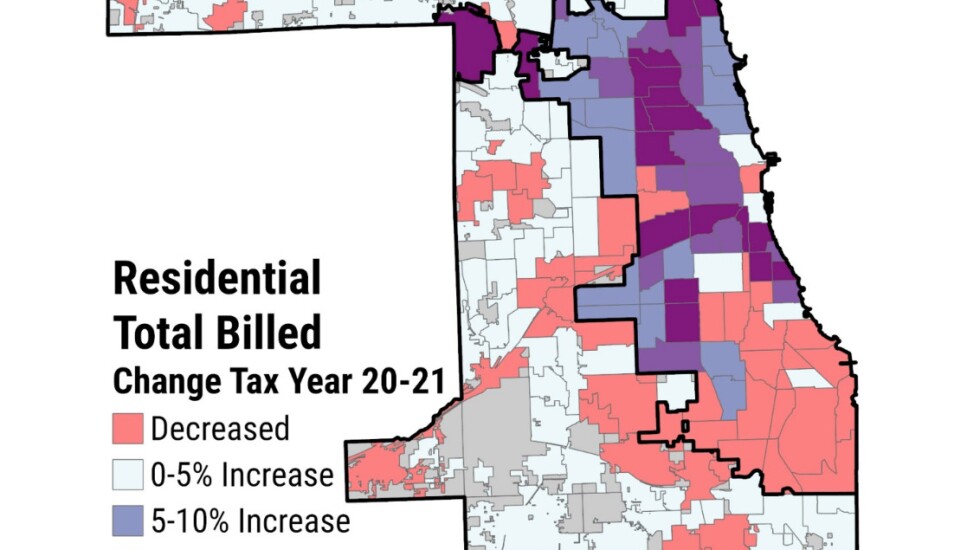Most Cook County property owners will see a larger tax bill this year, but owners in gentrifying Latino neighborhoods in Chicago will see some of the biggest hikes.
Some will see tax bills three times as large.
County Treasurer Maria Pappas released an analysis of the new tax bills Thursday morning. She said the hikes were “overly burdensome on middle-class, working people” and pointed to several reasons behind them:
Tax increment financing districts, rising property assessments and a new state law that allows local governments to recoup losses from reassessed property taxes.
Pappas called that law, known as a recapture provision, an “automatic tax increase” with “no oversight whatsoever.” That provision alone added $131 million to the county tax bill and accounted for one-fifth of the increase.
“The recapture law will be a permanent boon to taxing districts and an annual burden on taxpayers,” Pappas’ analysis found.
Gentrification was behind the biggest tax increases that hit mainly minority or Latino neighborhoods, Pappas said.
On the Lower West Side, property owners saw their median tax bill more than double, from $2,275 to $7,239, according to the analysis.
In Avondale, another heavily Hispanic neighborhood, the median tax bill went up 27%.
Those increases could price out many people from their homes.
“The system is broken,” said Ald. Byron Sigcho-Lopez, whose 25th Ward covers much of the Lower West Side that saw the biggest hikes. He called for reforms to the property tax system and blamed corrupt politicians who took advantage of the Cook County Board of Review to give their buddies tax breaks while passing on the slack to homeowners.
“This is simply unethical,” he said. The median tax increases in the analysis don’t represent those who were hit the hardest, he said. He’s talked to a homeowner that saw their tax bill triple this year. He called for a property tax system that considers the ability to pay.
Meanwhile, several neighborhoods saw median decreases in property tax bills. In West Garfield Park, homeowner taxes dropped nearly 45%.

The analysis, which Pappas’ office does yearly, examined the 1.8 million tax bills posted online in November. Paper bills begin arriving in mailboxes Thursday.
The median tax bill for homeowners increased this year by 8%.
The analysis found that property taxes rose by $614 million — a 3.8% increase — for a total of $16.7 billion. The money pays for schools, public safety, medical care, parks, libraries and other government services. Tax bills have been rising each year in Cook County for 22 years.
Homeowners are picking up most of that increase: about $330 million, or 53.6%. That’s due to reassessments of commercial properties that saw their values lowered. Homeowners had to pick up the slack.
Pappas’ analysis points to other reasons tax bills increased so much this year.
Chicago’s City Hall increased its tax burden by $94 million, and Chicago Public Schools increased its levy by $114 million, her office said.
Pappas said the majority of property tax money goes to funding schools. To save homeowners from being priced out, she said county residents need to consider funding schools in other ways.
“They need to find another way to fund schools other than property taxes,” Pappas said. If this continues, people will begin to leave,” she said.
And although the assessor’s office reduced home values last year by 8% to 12%, real estate prices rose as well, increasing overall taxes, Pappas’ analysis found.
“This is tragic and can have terrible consequences for the community,” said Ald. Rossana Rodriguez-Sanchez, whose 33rd Ward covers parts of Avondale that saw a median tax bill increase from $6,060 to $7,398.
“We’ve already seen a displacement of Latinos to the suburbs because they can’t afford to live here already. Many live on fixed incomes. They can’t afford a property tax increase,” she said. “It’s incredibly disappointing the people making these decisions aren’t considering the consequences these actions have in vulnerable communities,” she said.
Property assessment increases last year gave TIF districts an extra $141 million boost, spurring development in those districts. But little of that tax money relieved the overall burden on homeowners, Pappas’ analysis found.
Taxes also rose in suburban Cook County. In the north and northwest suburbs, taxes rose by $94 million, with most homeowners and commercial property owners facing higher bills. In the south and southwest suburbs, taxes grew by a smaller amount: $35 million.







